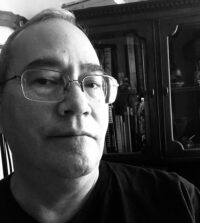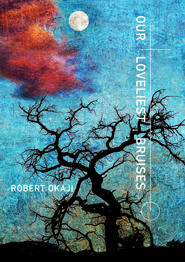Our Authors

Robert Okaji
Engendered of the tenuousness and resilience typifying the human condition, Robert Okaji’s long-anticipated debut, Our Loveliest Bruises, is a lyric tour de force of tenderness and vision,as singularly wise as it is both achingly and welcomingly beautiful. Unmoored in the wake of his mother’s untimely death, Okaji’s speaker embarks on an allegorical odyssey Eastward (Higashi) in search of his bearings, from which his Japanese “mother’s last breath” has left him psychologically severed. In his inevitable encounters with one ineffable version after another of that ever-looming sense of absence he sets out to transcend, the poet deftly renders absence’s guises palpably manifest, that he may now find himself grounded and fortified: by the “Wind,” an entity whose borderlessness proscribes it from perceiving, though it “touches”; by his beloved mother’s no-less-bodiless ghost who “never speaks,” even as she influences her grieving son’s experiential truth; and ultimately, within the limitless gamut of human experience that absence, itself, affords. By way of his unmatched precision, and reverence, Okaji navigates the darkness of loss to discover living within the vessel of himself—a reliquary to bear our loveliest bruises that attest to our most human griefs and joys—the light that is tantamount to being alive.
To sit with Robert Okaji’s poems is to come into the presence of Spirit, breathing and alive, grounded in exquisite technique and gloriously unpretentious. Throughout Our Loveliest Bruises, Okaji renders into spare and elegant verse some mighty themes— loss, grief, acceptance and the search for the elusive and yet all-pervading harmony that underlies the universe. My mouth is a blade, he writes, and I am also that bruised stem seeking light. In that seeking, Okaji crafts a treasury of poems to be sung for long generations.
— Anna Marie Sewell, Changing Moon, Poems and Songs, Poet Laureate, Edmonton Alberta, Canada, 2011-2013
This is a poet who, rooted at the edge of the Void, sings. And sings deeply. A book which reveals and bares itself at the point between life/death/life/ ghost. When do we begin to know when we will die? What vision(s) come upon us in that knowing? Okaji understands what poetry can do: he does it with an exacting and delicate touch, an eastern sensibility of choice, philosophy, endings, and time. A whisper nailed to the wall. He is a poet of the ineffable—a poet of Absence made tangible. His thinking has the architecture of Zen feeling. Is the language/in each afterlife the same or does it fragment and/scatter with every fallen petal? Yes, this is a book of mourning, yet so fully alive as to wake the reader into the intimacy of living.
— Veronica Golos, GIRL
Robert Okaji lives in Indiana with his wife, the poet Stephanie L. Harper. He served without distinction in the U.S. Navy, lived the hand-to-mouth existence of a bookstore owner, toiled as a university administrator, and, more recently, bagged groceries for a living. His honors include the 2021 riverSedge Poetry Prize, the 2021 Etchings Press Poetry Book Award, and the 1968 Bar-K Ranch Goat-Catching Championship. Among his multiple chapbooks are I Have a Bird to Whistle (Luminous Press, 2019) and Buddha’s Not Talking (Slipstream Press, 2022). His poetry has appeared in more than 200 anthologies and journals, including A Fire to Light our Tongues: Texas Writers on Spirituality (TCU Press, 2022), Essential Voices: A Covid-19 Anthology (West Virginia University Press, 2023), as well as Threepenny Review, Southern Humanities Review, Boston Review, Vox Populi and The Evergreen Review.

